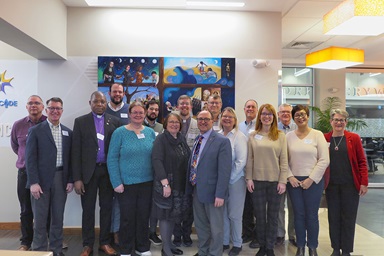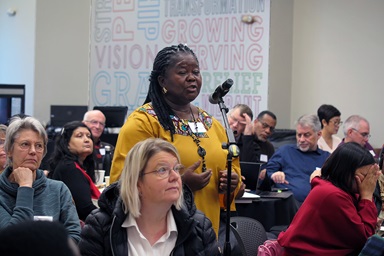United Methodist and ecumenical representatives expressed frustration over what they view as President Bush’s refusal to listen to other religious voices regarding Iraq.
Their concerns surfaced during a May 4 press conference at the United Methodist General Conference.
Bishop McKinley Young, of the African Methodist Episcopal Church, referred to the Iraq war as a “faith-based war” during his sermon in the morning worship service.
Young made that reference, he said, because of the president’s comments to journalist Bob Woodward about talking to “a higher Father” than his own father for advice about going to war. The comments are found in Plan of Attack, Woodward’s new book, with behind-the-scenes accounts of the decision to go to war.
The bishop noted that “he’s not the only one who hears from God” and complained about using that as a sanction for war. “We did not elect him as the priest of the nation,” Young said. “We elected him as president.”
Bishop Melvin Talbert, ecumenical officer for the United Methodist Council of Bishops, said he was disappointed by Bush’s snubbing of leaders of his own denomination. “One of the pains on my heart has been his claim to be ultra religious, yet he has not found the time to receive a delegation of United Methodist bishops,” he explained.
Talbert added that every other U.S. president, with the exception of Ronald Reagan, has received such a delegation.
Young noted that a letter was sent to President Bush last spring on behalf of bishops from the United Methodist Church and three historically black Methodist denominations. A response was given, but Bush showed no willingness to allow church leaders to meet with him to share their concerns, he said.
Talbert, who was an outspoken advocate of peaceful alternatives to war with Iraq, pointed out that the United Methodist Church has a clear position on war in its Social Principles. “War is, for us, not the first step you take to get peace,” he explained. “It’s the last resort.
“It seems the commitment to the common good has dropped off the radar screen for this administration,” the bishop said.
Churches are continuing to speak out for peace in Iraq, according to Robina Winbush, a representative of the Presbyterian Church (USA). The National Council of Churches, for example, is promoting a “second season of peacemaking” that will include a statement from religious leaders and services over Memorial Day weekend to remember the dead on all sides of the Iraqi conflict.
“We are continuing to look for ways the United Nations can have a key role (in Iraq),” she said.
In a variety of settings, the churches also are interacting with Muslims as a way to promote dialogue and educate members into a better understanding of the Islamic faith.
Bishop Albert “Fritz” Mutti, president of the United Methodist Commission on Christian Unity and Interreligious Concerns, noted that his agency reached out to the Islamic community shortly after the terrorist attacks on Sept. 11, 2001, and has pledged to increase interaction with Muslims during the next four years.
Other connections with Muslims are being made through groups like the National and World Council of Churches. “The real tragedy is the whole demonization of a religious community (because of terrorist actions),” Winbush said.
*Bloom is a United Methodist News Service news writer.
News media contact: (412) 325-6080 during General Conference, April 27-May 7. After May 10: (615) 742-5470.
Related
Like what you're reading? Support the ministry of UM News! Your support ensures the latest denominational news, dynamic stories and informative articles will continue to connect our global community. Make a tax-deductible donation at ResourceUMC.org/GiveUMCom.





